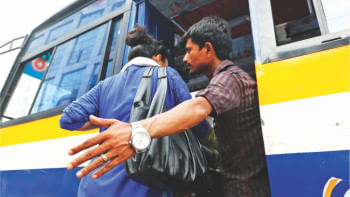Nothing is being done about women's safety on public transport

Over the past few years, several surveys have been conducted on women commuting on public transport to understand the extent of harassment they have to undergo – and the results have been nothing short of alarming. In the latest survey, conducted online during May-June, it was found that around 87 percent of women faced some form of harassment on public transport at least once in their lives. The survey, conducted on over 5,000 women across 24 districts, has also revealed that 36 percent of female commuters faced sexual harassment on buses, launches, trains and at terminals, and 57 percent of respondents considered public transport as totally unsafe.
Recently, another survey conducted by an NGO to learn about the psychological impacts of such harassment on women and girls led to the finding that around half of the victims of harassment suffer from mental health issues later in their lives. These findings are concerning, to say the least, and should get proper attention from our policymakers.
Unfortunately, despite these damning surveys on female commuters, we haven't seen or heard of any steps taken by the authorities to make public transport safe for them. Such inaction makes harassers feel emboldened, and consequently we might see a further uptick in such incidents in the future.
Unfortunately, despite these damning surveys on women's safety on public transport, we haven't seen any action from the authorities to address this situation. Such inaction emboldens the harassers, and consequently we might see a further uptick in such incidents in the future. The question is: why are the authorities not giving the issue the importance it deserves? The organisations that have conducted the surveys have also come up with suggestions to improve the situation. Among them are installing CCTV cameras and vehicle-tracking systems in all passenger vehicles, mentioning the names of drivers and helpers in the nameplates of every vehicle, etc. These are basic safety measures that can be undertaken any moment. So, what is stopping them from doing this bare minimum?
Taking such steps will definitely help identify the culprits, and also deter potential culprits from harassing female passengers in the future. Besides, increasing the number of women-only buses and having a system where women can lodge complaints for public-transport harassment are also vital. The fact that only 36 percent of women protested when they were harassed and only one percent went to law enforcers for redressal, as revealed by the recent survey, reflect the stigma and lack of social or legal support extended to the victims.
However, taking the above-mentioned steps alone will not solve the issue; for that, we need to address the root of the problem. The society's mindset that public transport is a place for men, and men's perception that women are occupying their space, need to be changed. Such patriarchal mindsets have had disturbing consequences in other areas as well. A change in this scenario is only possible if our policymakers properly respond to them.


 For all latest news, follow The Daily Star's Google News channel.
For all latest news, follow The Daily Star's Google News channel. 




Comments